17 releases
| 0.2.2 | Mar 4, 2025 |
|---|---|
| 0.2.1 | Mar 4, 2025 |
| 0.1.14 | Mar 2, 2025 |
| 0.1.13 | Jun 25, 2024 |
| 0.1.4 | Feb 11, 2024 |
#258 in Command-line interface
412 downloads per month
125KB
2.5K
SLoC
jlf
jlf is a CLI that converts hard-to-read JSON logs into colorful human-readable logs.
Simply pipe your JSON logs with jlf.
cat ./examples/dummy_logs | jlf
Basic Example
left: cat ./examples/dummy_logs
right: cat ./examples/dummy_logs | jlf
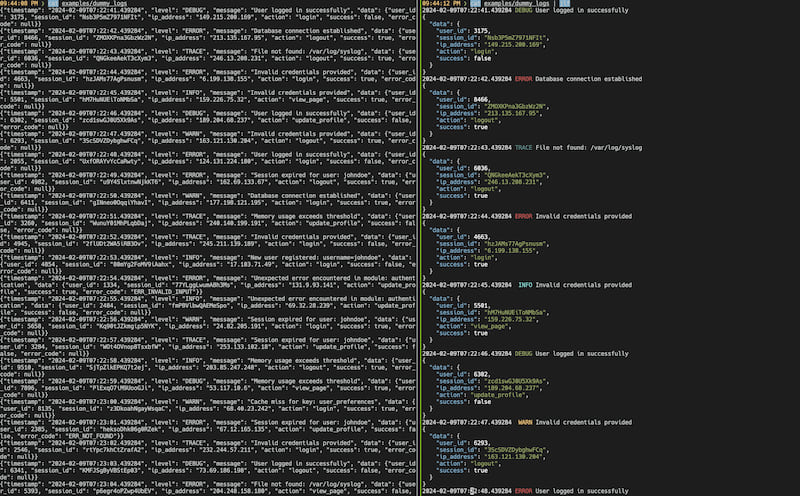
Installation
Cargo
cargo is a rust's package manager.
To install cargo, visit Install Rust - Rust Programming Language
cargo install jlf
Manual Installation
You can also clone the repo and install it manually.
git clone https://github.com/PoOnesNerfect/jlf.git
cd jlf
cargo install --path . --locked
Table of Contents
- Basic Example
- Installation
- Table of Contents
- CLI Options
- Usage
- Custom Formatting
- Config File
- Neat Trick
- Implementation
CLI Options
$ jlf -h
CLI for converting JSON logs to human-readable format
Usage: jlf [OPTIONS] [FORMAT] [COMMAND]
Commands:
expand Print variable with its inner variables expanded. If no variable is specified, the default format string will be used
list List all variables
help Print this message or the help of the given subcommand(s)
Arguments:
[FORMAT] Formatter to use to format json log. [default: {&output}]
Options:
-v, --variable <KEY=VALUE> Pass variable as KEY=VALUE format; can be passed multiple times
-n, --no-color Disable color output. If output is not a terminal, this is always true
-c, --compact Display log in a compact format
-s, --strict If log line is not valid JSON, then report it and exit, instead of printing the line as is
-t, --take <TAKE> Take only the first N lines
-h, --help Print help
-V, --version Print version
Usage
Compact Format
By default, jlf prints the standard log in the first line, then rest of json data in a pretty format in the following lines.
If you want to print everything in a single line, you can pass the option -c/--compact.
cat ./examples/dummy_logs | jlf -c
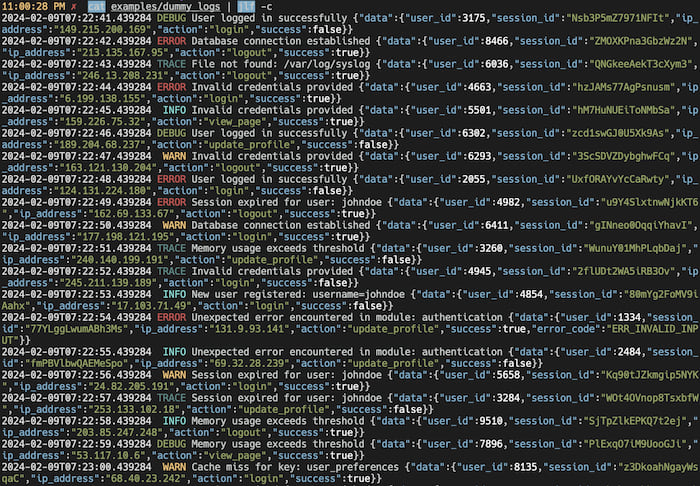
No Color
By default, jlf prints in pretty colors.
However, when you pipe logs into a file, jlf will automatically write with no colors, so the file isn't corrupted with ANSI characters.
For any reason, if you would like to print with no colors to the terminal, you can pass the option -n/--no-color.
# writing into a file will remove all ANSI characters automatically
cat ./examples/dummy_logs | jlf > pretty_logs
# pass `-n` to print to terminal with no colors
cat ./examples/dummy_logs | jlf -n
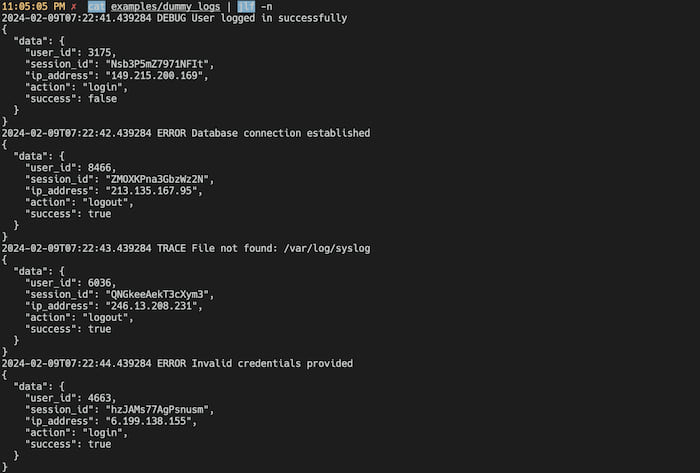
Strict
When jlf encounters log lines that are not valid JSON, it will simply pass the line through without any transformation.
However, if you would rather like to exit with an error when encountered an invalid JSON or a non-JSON line, pass the option -s/--strict.
It will even print out a snippet of where the JSON is invalid.
# pass `-s` to exit when non-JSON is found
cat ./examples/dummy_logs | jlf -s
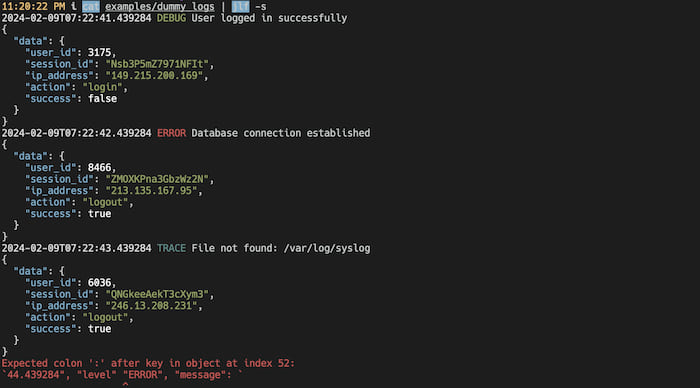
Custom Formatting
You can optionally provide your custom format of the output line.
# Provide custom format. If `data` field exists, print `data` field as `json`; if not, print "`data` field not found".
cat ./examples/dummy_logs | jlf '{#if data}{data:json}{:else}`data` field not found{/if}'
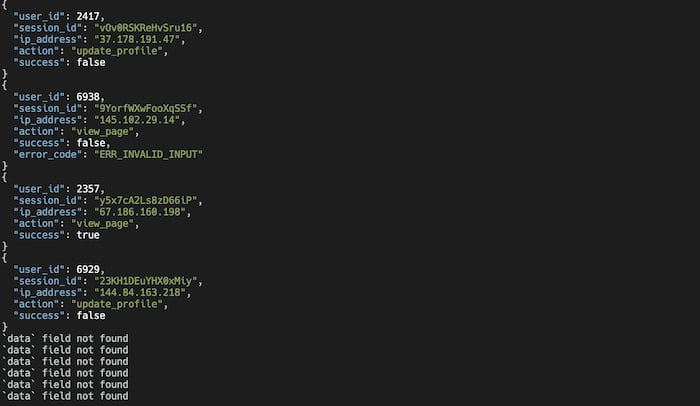
Isn't it neat? The formatting syntax is very simple and readble, inspired by popular formatting syntax from the likes of rust and svelte.
We'll go over all the formatting rules now: fields, styles, conditionals, and variables.
Especially, variables is a new addition in jlf v0.2.0 which unlocked the power of granular customization.
Accessing Fields
To print the fields of JSON log, simple write the field name in braces {field1}.
# Example Line: {"message": "User logged in successfully", "body": "My Body", "data": {"user_id": 3175, "session_id": "Nsb3P5mZ7971NFIt", "ip_address": "149.215.200.169", "friends":["Jack","Jill"]}}
# access the field by writing the field in braces
cat ./examples/dummy_logs | jlf 'Msg: {message}!' # -> Msg: User logged in successfully!
# if field may not exist, provide fallback fields separated by '|'. It will print the first field that exits.
cat ./examples/dummy_logs | jlf 'Msg: {msg|body|message}!' # -> Msg: My Body!
# access nested field using '.' as a separator.
cat ./examples/dummy_logs | jlf 'User {data.user_id} logged in!' # -> User 3175 logged in!
# access array items using '[n]' to index at `n`.
cat ./examples/dummy_logs | jlf 'My girl friend is {data.friends[1]}.' # -> My girl friend is Jill.
# if the field is an object or array, it will it as pretty json by default.
cat ./examples/dummy_logs | jlf 'user data: {data}'
# ->
# user data: {
# "user_id": 3175,
# "session_id": "Nsb3P5mZ7971NFIt",
# "ip_address": "149.215.200.169",
# "friends": [
# "Jack",
# "Jill"
# ]
# }
# print the entire json by writing `{.}`
cat ./examples/dummy_logs | jlf 'user({data.user_id}): {message}\n{.}'
# ->
# user(3175): User logged in successfully
# {
# "message": "User logged in successfully",
# "body": "My Body",
# "data": {
# "user_id": 3175,
# "session_id": "Nsb3P5mZ7971NFIt",
# "ip_address": "149.215.200.169",
# "friends": [
# "Jack",
# "Jill"
# ]
# }
# }
# print only the un-printed fields by writing `{..}`
cat ./examples/dummy_logs | jlf 'user({data.user_id}): {message}\n{..}'
# ->
# user(3175): User logged in successfully
# {
# "body": "My Body",
# "data": {
# "session_id": "Nsb3P5mZ7971NFIt",
# "ip_address": "149.215.200.169",
# "friends": [
# "Jack",
# "Jill"
# ]
# }
# }
Styling Fields
You can provide styles to the values by providing styles after the :.
cat ./examples/dummy_logs | jlf '{timestamp:bright blue,bg=red,bold} {level|lvl:level} {message|msg|body:fg=bright white}'
If you have multiple styles, you can separate them with ,, like fg=red,bg=blue.
You can optionally provide the style type before the =. If you don't provide it, it will default to fg.
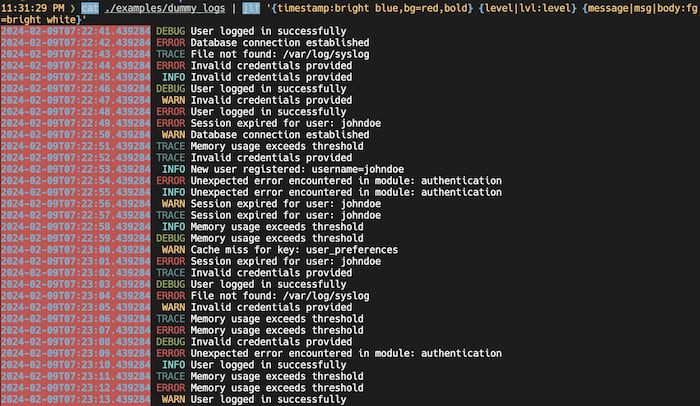
level is a special style that is only applied to level field; it will print in different colors for different levels.
Available Styles
dimmed: make the text dimmedbold: make the text boldfg={color}: set the text color{color}: same asfg={color}bg={color}: set the background colorindent={n}: indent the value bynspaceskey={color}: sets the color of the key in JSON objectvalue={color}: sets the color of the non-string types in JSON objectstr={color}: sets the color of the string data type in JSON objectsyntax={color}: sets the color of the syntax characters in JSON objectjson: print the json value as json; this is the default and only available format, so you don't have to specify itcompact: print in a single linelevel: color the level based on the level (debug = green, info = cyan, etc.)
In the above list, {color} is a placeholder for any color value.
You can view all available colors in colors.md.
Conditionals
For conditionals, main conditional starts with # like {#if ..}, else conditions start with : like {:else ..}, and ending symbols start with / like {/if}.
{#if cond1}{:else if cond2}{:else}{/if}
if condition accepts a single field or multiple fields separated by '|'.
if checks for the truthyness of the given field values; one difference with Javascript truthiness is that empty object and array is evaluated to false.
# Example Line: {"message": "User logged in successfully", "body": "", "data": {"user_id": 3175, "count": 0, "friends":[]}}
# if field doesn't exist, or is null, it's `false`.
cat ./examples/dummy_logs | jlf '{#if msg}msg: {msg}{:else if message}message: {message}{/if}' # -> message: User logged in successfully!
# empty string is also `false`.
cat ./examples/dummy_logs | jlf '{#if body}body = {body}{:else}no body{/if}' # -> no body
# number 0 is also 'false'.
cat ./examples/dummy_logs | jlf '{#if count}count = {count}{:else}count is zero{/if}' # -> count is zero
# empty object or arrays are also 'false'.
cat ./examples/dummy_logs | jlf '{#if data.friends}friends: {data.friends}{:else}I have no friends{/if}' # -> I have no friends
# nesting is allowed
cat ./examples/dummy_logs | jlf '{#if data.user_id}user ({data.user_id}) {#if message}has a message{:else}has no message{/if}{/if}.' # -> user (3175) has a message.
# if multiple fields are given, it will return `true` if at least one of them is `truthy`.
cat ./examples/dummy_logs | jlf "{#if msg|body|data.count|message}I'm still here{/if}" # -> I'm still here
{#key field1}{:else key field2}{:else}{/key}
key condition accepts a single field or multiple fields separated by '|'.
key checks the existence of the given field; even when the field value is falsey, it will evaluate to true if the field exists, and is not null.
# Example Line: {"message": "User logged in successfully", "body": "", "data": {"user_id": 3175, "count": 0, "friends":[]}}
# if field doesn't exist, or is null, it's `false`.
cat ./examples/dummy_logs | jlf '{#key msg}msg: {msg}{:else key message}message: {message}{/key}' # -> message: User logged in successfully!
# empty string is still `true`.
cat ./examples/dummy_logs | jlf '{#key body}body = {body}{:else}no body{/key}' # -> body =
# number 0 is also 'true'.
cat ./examples/dummy_logs | jlf '{#key count}count = {count}{:else}count is zero{/key}' # -> count = 0
# empty object or arrays are also 'true'.
cat ./examples/dummy_logs | jlf '{#key data.friends}friends: {data.friends}{:else}I have no friends{/key}' # -> friends: []
# nesting is allowed
cat ./examples/dummy_logs | jlf '{#key data.user_id}user ({data.user_id}) {#key message}has a message{:else}has no message{/key}{/key}.' # -> user (3175) has a message.
# if multiple fields are given, it will return `true` if at least one of them exists.
cat ./examples/dummy_logs | jlf "{#key msg|no_field|message}I'm still here{/key}" # -> I'm still here
{#config config1}{:else}{/config}
config condition accepts a config: compact, no_color, or strict.
config returns true if the given config is set.
# Example Line: {"message": "User logged in successfully", "body": "", "data": {"user_id": 3175, "count": 0, "friends":[]}}
# If `compact` is set, print ` `; if `compact` is not set, print `\n`
cat ./examples/dummy_logs | jlf '{message}{#config compact} {:else}\n{/config}{..}'
# `jlf -c`
# User logged in successfully {"body":"","data":{"user_id":3175,"count":0,"friends":[]}}
#
# `jlf`
# User logged in successfully
# {
# "body": "",
# "data": {
# "user_id": 3175,
# "count": 0,
# "friends": []
# }
# }
# {:else config ..} is not supported.
cat ./examples/dummy_logs | jlf '{message}{#config compact} {:else config strict}strict{:else}\n{/config}{..}' -> INVALID
Variables
variable are key=value pairs, where key is a string, and value is a format string.
You can reference a variable in the format string or in another variable as {&variable}.
Here is the list of all default variables:
output = "{#key &log}{&log_fmt}{&new_line}{/key}{&data_fmt}"
log = "{×tamp|&level|&message}"
log_fmt = "{×tamp_fmt}{&level_fmt}{&message_fmt}"
timestamp_fmt = "{#key ×tamp}{×tamp:dimmed} {/key}"
timestamp = "{timestamp}"
level_fmt = "{#key &level}{&level:level} {/key}"
level = "{level|lvl|severity}"
message_fmt = "{&message}"
message = "{message|msg|body|fields.message}"
new_line = "{#key &data}{#config compact} {:else}\\n{/config}{/key}"
data_fmt = "{&data:json}"
data = "{..}"
You can see the variables with command jlf list.
When expanded, variable output will look like this:
{#key timestamp|level|lvl|severity|message|msg|body|fields.message}{#key timestamp}{timestamp:dimmed} {/key}{#key level|lvl|severity}{level|lvl|severity:level} {/key}{message|msg|body|fields.message}{#config compact} {:else}\n{/config}{/key}{..:json}
You can view the expanded variables by calling jlf expand VARIABLE.
For example, jlf expand log will output {timestamp|level|lvl|severity|message|msg|body|fields.message}.
If you don't provide at variable, jlf expand, it will print the fully expanded format string.
# Example Line: {"timestamp": "2024-02-09T07:22:41.439284", "level": "DEBUG", "message": "User logged in successfully", "data": {"user_id": 3175}}
cat ./examples/dummy_logs | jlf
# ->
# 2024-02-09T07:22:41.439284 DEBUG User logged in successfully
# {
# "data": {
# "user_id": 3175
# }
# }
# replace variable `message_log`
cat ./examples/dummy_logs | jlf -v message_fmt="Message: {&message}"
# ->
# 2024-02-09T07:22:41.439284 DEBUG Message: User logged in successfully
# {
# "data": {
# "user_id": 3175
# }
# }
# don't print timestamp by resetting variable `timestamp`
cat ./examples/dummy_logs | jlf -v timestamp=
# ->
# DEBUG User logged in successfully
# {
# "timestamp": "2024-02-09T07:22:41.439284",
# "data": {
# "user_id": 3175
# }
# }
# we can pass multiple variables
cat ./examples/dummy_logs | jlf -v timestamp= -v message_fmt="Message: {&message}"
# ->
# DEBUG Message: User logged in successfully
# {
# "timestamp": "2024-02-09T07:22:41.439284",
# "data": {
# "user_id": 3175
# }
# }
# instead of printing only unused fields, print the entire json
cat ./examples/dummy_logs | jlf -v data="{.}"
# ->
# 2024-02-09T07:22:41.439284 DEBUG User logged in successfully
# {
# "timestamp": "2024-02-09T07:22:41.439284",
# "level": "DEBUG",
# "message": "User logged in successfully",
# "data": {
# "user_id": 3175
# }
# }
# replace the entire format.
# default format string is `{&output}`; therefore, replacing variable `output`
# will replace the format string.
cat ./examples/dummy_logs | jlf -v output="{&message_fmt}: {&data_fmt}"
# User logged in successfully: {
# "timestamp": "2024-02-09T07:22:41.439284",
# "level": "DEBUG",
# "data": {
# "user_id": 3175
# }
# }
As you can see, it's extremely easy to update the format either partially or wholly by replacing the default variables.
Storing Variables
This is all and good, but it may still become annoying to specify variables as commands options everytime.
Instead we can set the variables in the config file.
jlf looks for the config file $XDG_CONFIG_HOME/jlf/config.toml and jlf.toml/.jlf.toml in the current workspace.
Priority of config and variables is Command options > jlf.toml|.jlf.toml > $XDG_CONFIG_HOME/jlf/config.toml.
Default config values are written in PoOnesNerfect/jlf/.jlf.toml.
You can copy this file into your config directory as jlf/config.toml or to your workspace as .jlf.toml or jlf.toml.
jlf.toml
# Default variables
# Replace or add variables as needed
[variables]
output = "{#key &log}{&log_fmt}{&new_line}{/key}{&data_fmt}"
log = "{×tamp|&level|&message}"
log_fmt = "{×tamp_fmt}{&level_fmt}{&message_fmt}"
timestamp_fmt = "{#key ×tamp}{×tamp:dimmed} {/key}"
timestamp = "{timestamp}"
level_fmt = "{#key &level}{&level:level} {/key}"
level = "{level|lvl|severity}"
message_fmt = "{&message}"
message = "{message|msg|body|fields.message}"
new_line = "{#key &data}{#config compact} {:else}\\n{/config}{/key}"
data_fmt = "{&data:json}"
data = "{..}"
Config File
Default config values are written in PoOnesNerfect/jlf/.jlf.toml.
Feel free to copy this into your config directory, like $XDG_CONFIG_HOME/jlf/config.toml, or your workspace directory as .jlf.toml or jlf.toml.
jlf.toml
# Default config values
[config]
format = "{&output}"
compact = false
no_color = false
strict = false
# Default variables
[variables]
output = "{#key &log}{&log_fmt}{&new_line}{/key}{&data_fmt}"
log = "{×tamp|&level|&message}"
log_fmt = "{×tamp_fmt}{&level_fmt}{&message_fmt}"
timestamp_fmt = "{#key ×tamp}{×tamp:dimmed} {/key}"
timestamp = "{timestamp}"
level_fmt = "{#key &level}{&level:level} {/key}"
level = "{level|lvl|severity}"
message_fmt = "{&message}"
message = "{message|msg|body|fields.message}"
new_line = "{#key &data}{#config compact} {:else}\\n{/config}{/key}"
data_fmt = "{&data:json}"
data = "{..}"
Neat Trick
Given that:
- If the input line is not a JSON, jlf will print the line as is.
- jlf removes all ANSI escape codes when piping to a file.
This means, you can just use jlf for non-JSON logs to pipe logs to a file with all the ansi escape codes removed.
When you just pipe it to a terminal, it will still style the logs as before.
Neat, right?
Implementation
JSON Parsing
The program cannot assume what the data structure of the incoming JSON logs will be. There is no guarantee that the application that is piping the logs uses the best practices for logging, or keep the consistent structure.
Thus, it must be able to parse any JSON log dynamically; that leaves us with having to use serde_json::Value.
But, can we do better? The answer is yes.
Although we cannot assume the data structure of the logs, we can still optimize for the common characteristics of JSON logs. So, I decided to make a custom JSON parser that is optimized for JSON logs.
Some characteristics of common json logs:
Below are some characteristics of common json logs that I thought I could optimize for:
- each log line is usually not super huge:
- log lines usually have similar structures:
- we don't need to transform data; we just reformat them.
Optimizations
Below are the optimizations I implemented for the corresponding items above:
- JSON objects are parsed into vec of key-value pairs instead of map.
- this way, we don't have to allocate memory for each key and value.
- Since each line of JSON log has a similar structure, we can reuse the existing vecs that are already allocated.
- we don't have to allocate memory for each line.
- Don't validate primitive values, since we don't need to transform the data.
- Instead of allocating new
Strings for each key and value, we use&strslices of the log string.
Benchmarks
So, how did it perform? That's the only thing that matters.
custom parse time: [987.52 ns 993.59 ns 1.0006 µs]
Found 12 outliers among 100 measurements (12.00%)
9 (9.00%) high mild
3 (3.00%) high severe
serde value parse time: [2.8045 µs 2.8357 µs 2.8729 µs]
Found 8 outliers among 100 measurements (8.00%)
4 (4.00%) high mild
4 (4.00%) high severe
serde structured parse time: [712.16 ns 714.93 ns 717.54 ns]
First section is the custom parse, second is the parsing into serde_json::Value parse and third is deserializing into a structured rust object.
The time is how long it took to deserialize a single line of json log.
As we can see, our custom parser is about 3x faster than the serde_json::Value parsing.
Yes, it is still slower than the structured parsing, but our parser is still pretty darn fast for parsing a dynamic JSON data.
Dependencies
~5–14MB
~152K SLoC